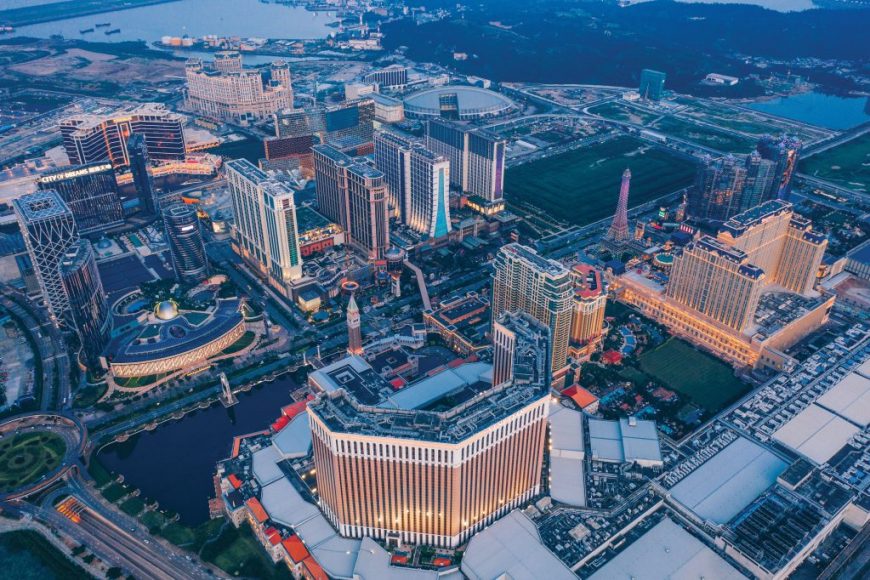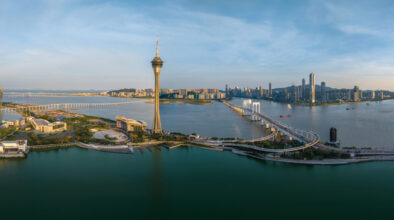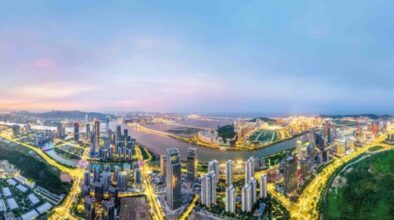TEXT Tony Chouin Lai
Macao’s integrated entertainment resorts have proved to be a major cog in the economic success of the SAR over the past two decades – and the city’s gaming industry is expected to keep reinventing itself in the years to come to entice tourists and more investment.

In 2002, when Macao’s government liberalised the local gaming market, everyone knew it would be good for the city’s economy. But even the academics and the analysts did not forecast quite how good it would be for the future development of the SAR. In the first full year after the city’s handover of its administration to China, the gross domestic product only amounted to MOP 53.94 billion – or US$6.68 billion. But last year, the city’s annual GDP totalled MOP 440.32 billion – or US$54.52 billion – representing a more-than-eightfold increase over two decades.
According to new data from the International Monetary Fund, Macao’s GDP per capita is poised to reach MOP 654,435 – or US$81,150 – this year, trailing behind Luxembourg as the world’s second richest place and rising from 29th place in 2001 when the IMF first recorded such data of the city. This economic wonder was only made possible thanks to the gaming industry, which accounts for half of Macao’s GDP. Figures for last year show that Macao’s accumulated gross casino gaming revenue for 2018 stood at about MOP 303.88 billion – or US$37.56 billion – a year-on-year increase of 14 per cent. The figures also show that the government collected nearly MOP 394.2 million – or US$48.8 million – in taxes on commissions paid by the gaming establishments to junkets, a 17 per cent hike on the previous year.
“Though nobody could have predicted the scale of the economic growth at the time of liberalisation,” says Davis Fong Ka Chio, director of the University of Macau’s Institute for the Study of Commercial Gaming, “the development direction was very clear: opening up the gaming market to facilitate the growth of local economy and other industries.” Documents show Edmund Ho Hau Wah, the city’s first Chief Executive, had participated in studies concerning the competitiveness of Macao before assuming office. “The studies suggested developing the gaming and tourism industries was a possible path,” says Fong, who is also a legislator.
And the outcomes now prove the accuracy of the studies. Following the end of the 50-year gaming monopoly of the Sociedade de Turismo e Diversões de Macau – or STDM, the Macao company owned by business magnate Stanley Ho and his family that was once the only gaming licensee in the city – not only has the number of gaming concessionaires and sub-concessionaires increased to six and the number of gaming establishments increased to 41, the city has also seen the introduction of a new business model: the integrated resort.
Much more than gaming
With the existence of casino-hotels only before the handover in 1999, multibillion dollar entertainment complexes can now be found across the Macao peninsula and in Cotai, offering more than just gaming and accommodation to attract travellers from across the globe, from Michelin-starred restaurants and shopping malls to touring concerts and shows. The Macao Tourism Industry Development Master Plan, released by the authorities in 2017 as a blueprint for the industry over the next 15 years, says that ‘Macao, with its unique and cherished culture and heritage blended with world-class integrated resorts, has laid a solid foundation for long-term [tourism] development’.
One of the beneficiaries from the blooming tourism and integrated resorts – Macao is expected to receive 40 million visitors this year, jumping more than fivefold from 7.44 million visitors 20 years ago – is the meetings, incentives, conferences and exhibitions, or MICE, industry. “If anybody looks for a place to host a meeting of up to 10,000 participants in Asia,” says Alan Ho, chairman of the board of directors for the Macau Convention and Exhibition Association, “Macao or Singapore are definitely the top choices due to the all-round facilities in the resorts.”
Before the handover of administration to China, the total area catering for MICE groups in Macao only amounted to less than 5,000 square metres. The space now totals more than 190,000 square metres. Alan Ho points out that the value added of the MICE industry has risen from less than MOP 50 million – or US$6.2 million – in the few years following 1999 to nearly MOP 3.55 billion – or US$440 million – in 2017. “With the addition of more MICE facilities and other offerings like dining, accommodation and entertainment in new projects and in the renovation of existing resorts,” adds Ho, “there is a bright prospect for the MICE sector over the next few years.”
According to the study on the development of the blueprint of Macao’s MICE sector, published by the government in 2017, the industry should continue its strategy of giving priority to conventions, while the sector could be more commercialised and internationalised, thus turning the city into a ‘destination for professional exhibitions and top quality fairs’.
Ace new projects
For more than a decade, work has been ongoing to create the glitzy entertainment complexes in the city we see today, as Macao is moving away from a purely gaming enclave to establishing itself as the World Centre of Tourism and Leisure, a position that was officially designated to the city by China’s central government in 2011. And the declining gaming participation rate of local residents is a testament to these efforts. According to research by the Institute for the Study of Commercial Gaming at the University of Macau, the local gaming participation rate was 40.9 per cent this year, the lowest level since the survey began in 2003 when the participation rate was measured at 67.9 per cent.
There are, though, a few resort projects still in the pipeline, including two that are linked to the family of Stanley Ho, founder of gaming operator SJM Holdings Ltd as well as STDM. They are the Grand Lisboa Palace, the flagship MOP 40.1 billion – or US$4.97 billion – property of SJM in Cotai which is expected to open by the second half f next year and the MOP 5.1 billion – or US$632 million – Lisboeta Macau that also becomes operational next year, providing a zip-line ride and indoor skydiving as new entertainment offerings in the city.
Other operators have also invested in the expansion and upgrade of their existing resorts to ramp up their entertainment and tourism portfolio. Wynn Resorts, parent firm of local gaming concessionaire Wynn Macau, has announced a MOP 16.15 billion – or US$2 billion – expansion plan for Cotai’s Wynn Palace, which will be ready by 2024. The expansion will add two hotel towers and a complex called Crystal Pavilion, which includes an art museum and an immersive entertainment theatre, to the resort.
Sands China is also undertaking a MOP 10.9 billion – or US$1.35 billion – renovation at its Sands Cotai Central resort, which will be rebranded as The Londoner Macao from 2020 and will feature a new 6,000-seat arena, British-themed retail and dining facilities and a replica of the clock tower in London that houses famous bell Big Ben. “Only in Macao, with its already-proven high return on investment rates and guaranteed 30-plus million visitors a year,” says Alidad Tash, managing director of gaming consultancy 2NT8, “are companies comfortable with spending 5 to 10 billion [US] dollars over the next 10 years.” It’s worth noting that Macao’s gaming licences for its six concession and sub-concession holders are due for renewal in 2022 with the possibility of any of the companies not being given an extension by the government, however credit ratings agencies Fitch and Moody’s have predicted over the past few months that it’s likely the operators will have their concessions renewed.


Tash, a former executive at integrated resorts in Las Vegas and Macao, says that gaming operators in Macao have a margin of error to come up with new products. “They can go ahead and shut down some of their areas,” he says, “and come up with a new concept like virtual reality shopping – something that might sound crazy for us but these companies have the money. If they’re innovative and work, another company may try that too.”
In stark contrast to other emerging markets of integrated resorts in the region, the mature conditions in Macao allow the city’s industry to be a leader in the pack. “This is where Macao revolutionises the entire integrated resort industry in terms of the latest innovation and technology – for example facial recognition – as well as the latest entertainment,” says Tash.
The recently released Outline Development Plan for the Guangdong-Hong Kong-Macao Greater Bay Area – which aims to promote the closer integration of nine cities in Guangdong and the two SARs – seeks to develop Macao as a world-class tourism and leisure centre. With regards to the plan, Fong believes the future path for the entertainment resorts and tourism industry in the city are clear: to draw more family and business tourists in with innovative offerings, as well as regional co-operation. “The industry could work with counterparts in different cities in the Greater Bay Area to develop unique tourism products to attract regional and international travellers,” he says, adding that he believes local resorts will keep on introducing new products like Las Vegas has done over the past few decades.
Branding together
According to Glenn McCartney, associate professor of integrated resort and tourism management at the University of Macau, the offerings from the resorts, government departments and other bodies in the city could better link together to present a more united front for tourists. “We still have a lot to do on the branding [of Macao],” he says. “It is pretty fragmented now. Many people do their own things but we should tie it [all] together. Just like the Las Vegas Strip to Nevada, the Cotai Strip as part of Macao can be a clear branding.”
For the resorts to come up with appropriate products, some believe there should be more details outlined concerning Macao as the World Centre of Tourism and Leisure. “It has never been clearly defined,” says McCartney. “Finding a definition is very important for us in years to come – what we want to be and how we achieve it.”
Whether there will be a more unified approach to branding or not, there is no doubt that Macao is in a strong place when it comes to its gaming industry and entertainment complexes – and it has been for almost 20 years now. The industry will surely change in the years to come but nothing will ever alter the fact that the integrated resort is at the heart of the city’s incredible success as an exciting international destination.
Entertainment complexes: the evolution
A timeline of the six gaming operators in Macao which created the backbone of the industry we see today:
2004 Sands Macao opens, the first foreign hotel and gaming property in the city since the market liberalisation in 2002.
2006 The openings of Wynn Macau and StarWorld represent respectively the first flagship properties in Macao for gaming operators Wynn Macau Ltd and Galaxy Entertainment Group.
2007 The Venetian Macao – covering gaming, accommodation, dining, retail, entertainment, MICE and other offerings – is inaugurated in Cotai, marking the commencement of the development of the Cotai Strip, home to the city’s cluster of mega resorts and Macao’s answer to the Las Vegas Strip. MGM China Holdings also opens its MGM Macau resort and Melco Resorts and Entertainment opens the Altira Macau.
2008 Stanley Ho’s SJM Holdings Ltd adds a new flagship
property – the Grand Lisboa Macau – next to its existing
signature Lisboa Hotel.
2009 Melco plants its flag in Cotai with the opening of the integrated resort City of Dreams Macau. This property sees the addition of more hotel towers and other facilities over the following years.
2011 Galaxy Entertainment unveils its first resort in Cotai – the Galaxy Macau.
2012 Sands China, operator of Sands Macao and The Venetian Macao, adds another mega project in Cotai – Sands Cotai Central.
2015 The development of the second phase of Galaxy Macau is completed, doubling the size of the resort, while Galaxy Entertainment Group also rebrands the adjoining property of Galaxy Macau as Broadway Macau, home to numerous local small eateries. Melco also expands its Cotai presence with the opening of Studio City, a Hollywood-inspired resort.
2016 The latest mega resort project of Sands China, The Parisian Macao, becomes operational. Wynn Macau opens its second property and also its first resort in Cotai – Wynn Palace.
2018 MGM China becomes the fifth gaming operator setting foot in Cotai with the opening of MGM Cotai.



